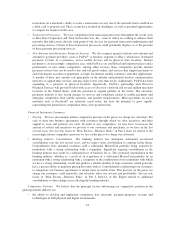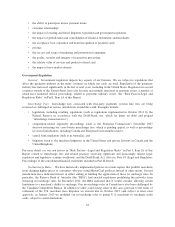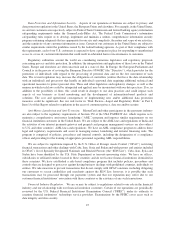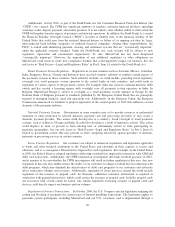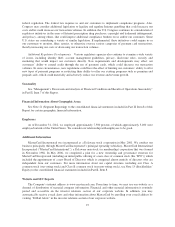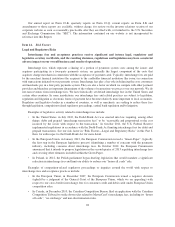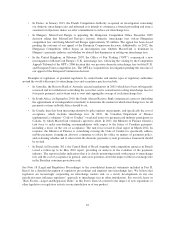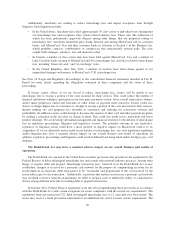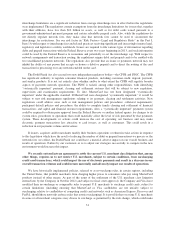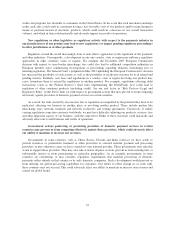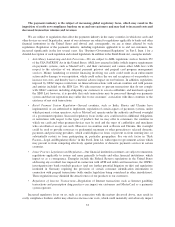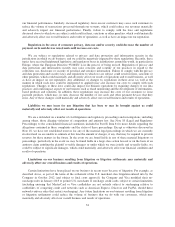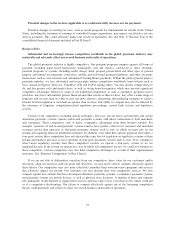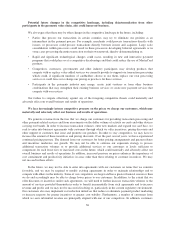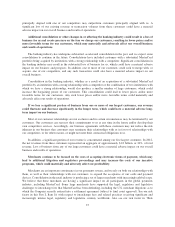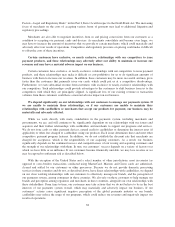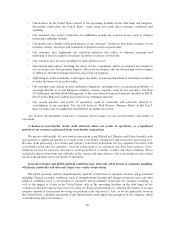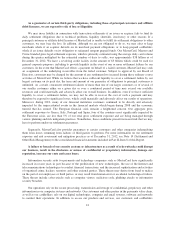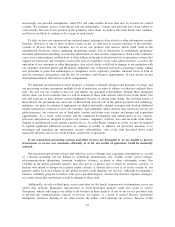MasterCard 2012 Annual Report Download - page 37
Download and view the complete annual report
Please find page 37 of the 2012 MasterCard annual report below. You can navigate through the pages in the report by either clicking on the pages listed below, or by using the keyword search tool below to find specific information within the annual report.The payments industry is the subject of increasing global regulatory focus, which may result in the
imposition of costly new compliance burdens on us and our customers and may lead to increased costs and
decreased transaction volumes and revenues.
We are subject to regulations that affect the payments industry in the many countries in which our cards and
other devices are used. In particular, many of our customers are subject to regulations applicable to banks and other
financial institutions in the United States and abroad, and, consequently, we are at times affected by such
regulations. Regulation of the payments industry, including regulations applicable to us and our customers, has
increased significantly in the last several years. See “Business-Government Regulation” in Part I, Item 1 for a
detailed description of such regulation and related legislation. In addition to the Dodd-Frank Act, examples include:
•Anti-Money Laundering and Anti-Terrorism—We are subject to AML regulations such as Section 352
of the USA PATRIOT Act in the United States, AML laws enacted in India (which impose requirements
on payments systems, such as MasterCard’s, and their customers) and various other AML laws with
respect to the activities of our internet payment gateway and prepaid card program management
services. Money laundering or terrorist financing involving our cards could result in an enforcement
action and/or damage to our reputation, which could reduce the use and acceptance of our products or
increase our costs, and thereby have a material adverse impact on our business. In addition, regulations
imposed by OFAC impose restrictions on financial transactions with certain countries and with persons
and entities included on the SDN List. We take measures to prevent transactions that do not comply
with OFAC sanctions including obligating our customers to screen cardholders and merchants against
the SDN List; however, it is possible that such transactions may be processed through our payments
system and that our reputation may suffer due to our customers’ association with these countries or the
existence of any such transactions.
•Retail Payment System Regulation—Several countries, such as India, Russia and Ukraine have
implemented, or are authorized to implement, regulation of certain aspects of payments systems, under
which payment system operators, such as MasterCard, operate under the authority and broad oversight
of a government regulator. Increased regulatory focus in this area could result in additional obligations
or restrictions with respect to the types of products that we may offer to consumers, the countries in
which our cards and other payment devices may be used and the types of cardholders and merchants
who can obtain or accept our cards. Moreover, in countries such as Russia and Ukraine, this oversight
could be used to provide resources or preferential treatment or other protection to selected domestic
payments and processing providers, which could displace us from, or prevent us from entering into, or
substantially restrict us from participating in, particular geographies. See our risk factor in “Risk
Factors—Legal and Regulatory Risks” in this Part I, Item 1A, with respect to government actions which
may prevent us from competing effectively against providers of domestic payments services in certain
countries.
•Issuer Practice Legislation and Regulation—Our financial institution customers are subject to numerous
regulations applicable to issuers and more generally to banks and other financial institutions, which
impact us as a consequence. Examples include the Federal Reserve regulations in the United States
addressing any overdraft fees imposed in connection with ATM and debit card transactions, the CFPB’s
investigation into bank overdraft practices (and any further potential litigation on this) and regulations
instituted in Germany requiring the provision of certain consumer identification information in
connection with prepaid transactions (with similar legislation being considered in other jurisdictions).
These regulations may diminish the attractiveness of our products to our customers.
•Regulation of Internet Transactions—Regulation of Internet transactions such as Internet gambling
transactions and prescription drug practices can impact our customers and MasterCard as a payments
system operator.
Increased regulatory focus on us, such as in connection with the matters discussed above, may result in
costly compliance burdens and/or may otherwise increase our costs, which could materially and adversely impact
33


